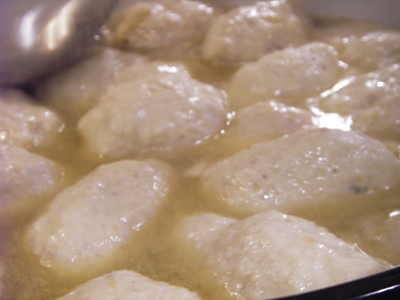I dragged the girls to the park to recite the blessing of the sun, and it started snowing. My children shivered under blankets while we sat through an unbearably long recitation of prayers (at least from the perspective of two little girls with frozen fingers.) In retrospect, I wish we had gone to the top of a mountain and said the one line blessing ourselves. If you haven’t done it yet – hurry outside right now, look up at the sun, and say :
I got teary-eyed realizing that the next time we do this ritual, in 28 years, my little girls will be all grown up.
I’m on my last pot, and no time to blog. In honor of those slimy balls of fish we’ll all be eating, or passing over, this evening, here’s a column I wrote last year for the PJ Library Newsletter about the charming book Five Little Gefiltes.

mmmmm…..
In our house, we do not serve gefilte fish. I can’t stand the smell, and like many hyper-vigilant moms, I try to limit our family’s fish consumption to wild, low-mercury varieties. And honestly, who isn’t creeped out by the mysterious gel it floats in? So when I sat down to read Five Little Gefiltes to my children, it’s not surprising that they were puzzled by the opening line – “What’s a Gefilte?”
“Well, it’s fish.” I began. “But it’s not a fish. Not like they have at the pet store.” Blank stares. “Someone takes a few fish and mixes them together.” A look of horror spreads over my four year old Ella’s face. “No,” I quickly interject. “Not living fish.” I stop. Have I ever actually mentioned that the lovely pink salmon we eat so often is…well…dead? “Let’s keep on reading!” I say, a little too cheerfully.
The girls love the book. We read it four times in a row and twice more later in the day. Both Ella and Zoe, Ella’s two year old sister, chime in OY VEY at all the appropriate moments (and a few extra, for good measure). And really, is there anything cuter than hearing a child speak Yiddish? Once, when Ella was three, she called me in distress, unable to identify a mysterious spot on her shirt. After a moment of deep scrutiny, she looked up with a serious look on her face and proclaimed: “It’s shmutz.” I beamed. (Or should I say, kvelled?)
When I was 8, I begged my grandmother to teach me how to speak Yiddish. After hours of practice, I could recite to anyone who would listen, “Es vet helfen vi a toiten bahnkes“. This translates as “It would do as much good as cupping a corpse” (Cupping, a traditional folk remedy, has dubious therapeutic value for the living, but even its practitioners agree that it’s pretty much wasted on the dead.) Not a phrase likely to appear in most travel dictionaries, but unfortunately that and “go poo in the ocean” are the only two complete sentences in my Yiddish repertoire.
Still, I’ve had enough exposure to Ashkenazi culture to catch, and enjoy, all of the clever references tucked into the illustrations of Five Little Gefiltes. (My personal favorite: Little Miss Muffett sat on her tuches.) But I don’t speak Yiddish. My mother doesn’t speak Yiddish. My husband and his parents, who are French Canadian, certainly don’t speak Yiddish. . My grandparents, who spoke Yiddish, died long before my children were born. Sure, I drop the occasional oy, and ukh. (Is that actually Yiddish? It sure sounds it.) Like any former New Yorker, I shlep my bags rather than carry them. But overall, very little has trickled into my daily vocabulary, a mere two generations after my grandfather arrived at Ellis Island. So what chance is there that my own children will even recognize, much less speak, any Yiddish
When I grew up, I chose to make my home an hour from the nearest kosher deli, three hours from the everyone-speaks-Yiddish-even-if they’re-not-Jewish island of Manhattan, and a world away from the very Jewish suburbs where I was raised. I did this because I prefer farmland to malls, prefer tofu to roast beef, prefer my synagogue where everyone looks different to the many shuls I’ve visited where everyone seems to look the same. But is there a trade-off? My children will grow up learning Hebrew, celebrating Shabbat, and keeping kosher. But I want more. I want them to laugh during Hannah and Her Sisters when Woody Allen returns home from his conversion to Catholicism with a loaf of white bread and a jar of mayonnaise. I want them to smile with warm familiarity when they hear a Borscht Belt accent. I want them to gently admonish their own children to stop kvetching. To me, that’s “real” Jewish.
How can I accomplish this with the life I’ve chosen? Should I self consciously insert my limited Yiddish (well, not all of my limited Yiddish) into daily conversation, just to make sure it gets heard? Do I force my children to watch Mel Brooks movies (ok, not Men in Tights: that would be child abuse)? Must I serve (shudder) gefilte fish?
Or, can I embrace the fact that the Jewish culture my grandchildren inherit will be different from the culture of my bubbe and zayde. Not something less, but something very, very different.

